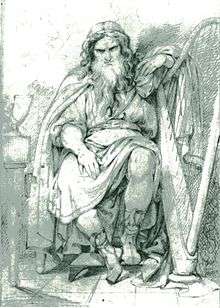Þjóðólfr of Hvinir
Þjóðólfr ór Hvinir (anglicized as Thjódólf of Hvinir or Thiodolf; fl. late 9th–early 10th c. AD),[1] is a Norwegian skald, said to have been one of the court-poets of the semi-legendary Norwegian king Harald Fairhair.[2][3] His name suggests that he was from the region of Hvinir (Kvinesdal).[1] Two skaldic poems, Haustlǫng (Autumn-long) and Ynglingatal (Enumeration of the Ynglingar), are generally attributed to him.[2][3]
Works
Both Haustlǫng and Ynglingatal are ascribed to Þjóðólfr of Hvinir from a relatively early period. They were preserved, along with some other of his verses, by the 13th-century Icelandic poet Snorri Sturluson in the Prose Edda.[2] A third poem, Hrafnsmál, is also attributed to him by Snorri, although scholars rather think that it was composed by another of Harald Fairhair's court-poets named Þórbjǫrn Hornklofi.[2]
Þjóðólfr composed Ynglinga tal for Ragnvald Heidumhære, a chieftain from Vestfold (Oslofjord). The poem tells about the lives of the Ynglingar, a dynasty of kings from Uppsala.[3]
Haustlǫng is centred on two mythological scenes: Loki's betraying of Iðunn, the Æsir's "old-age cure", who was snatched from them by the eagle-shaped jötunn Þjazi; and Thor's victorious combat against the strongest of the jötnar, Hrungnir.[3]
References
- Marold, Edith (2012). "Text - Þjóðólfr ór Hvini, Ynglingatal". abdn.ac.uk. Retrieved 2020-05-24.
- Orchard 1997, p. 160.
- Lindow 2001, p. 16.
Bibliography
- Lindow, John (2001). Norse Mythology: A Guide to Gods, Heroes, Rituals, and Beliefs. Oxford University Press. ISBN 978-0-19-983969-8.
- Orchard, Andy (1997). Dictionary of Norse Myth and Legend. Cassell. ISBN 978-0-304-34520-5.
